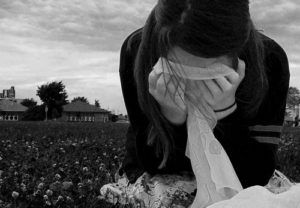 I was 27 when my father died. I went numb and took a job in Japan as a group leader for 10 American high school exchange students. The job required that I also live with a family. When our bus pulled into the supermarket parking lot where we were to meet our host parents, all I knew about Yuko was that she was in her 40s, she taught English, and she was recently widowed. A slight woman with chin-length hair held a sign bearing my name.
I was 27 when my father died. I went numb and took a job in Japan as a group leader for 10 American high school exchange students. The job required that I also live with a family. When our bus pulled into the supermarket parking lot where we were to meet our host parents, all I knew about Yuko was that she was in her 40s, she taught English, and she was recently widowed. A slight woman with chin-length hair held a sign bearing my name.
“My American daughter,” she said, as I extended my hand.
“My Japanese mother,” I replied.
We said nothing as we busied ourselves with my luggage. I thought of us as sad and weary animals smelling each other’s open wounds. I was wobbly with my grief but grateful with recognition. I had found another from the tribe of the grieving.
Yuko’s two teenage daughters were away for the summer, and we were alone in her small house. “Call me Mom,” she said.
Mom awakened me each morning, calling my name in a feathery voice. She rolled up my futon, fetched my slippers. She served me breakfast of cold beans, salty fish bits and noodles. She praised my dexterity with chopsticks and scolded me for my nail biting. She washed my feet. Whatever she told me to do, I did. Why not? I felt a grey sort of nothing about anything.
About a month into my stay, we dressed to go out for an afternoon of grocery shopping. As I appeared before her, ready to go, she shook her head. Pointing to my skirt, which was knee-length, she said, “No so good.” No explanation from her. No rebuttal from me. I followed her to the closet. “This OK,” she said, choosing some pants. “And this shoes good,” she said, selecting an alternative pair.
As I changed clothes, I felt flutters of resentment. Emotional gas hissed through a fissure. “Only one letter separates smothering from mothering,” I wrote in my journal that night. Exclamation points adorned my sentence.
About a week before I was to leave, Mom announced a night out. It was our first; evenings usually passed quietly at home with both of us asleep by 9 p.m. She invited two friends. We rendezvoused in a karaoke bar.
The bar had hostesses heavy on eye makeup and tarty charm, gaggles of whirly businessmen in suits and un-ironic skinny ties. Low lights, vinyl-covered banquettes, highballs spangled with neon-colored swizzle sticks.
A tiny stage stood in the far corner, decorated with silver bunting. Onstage a mic and a podium groaning under a songbook as thick as the Bible. There was one on every table. I watched as businessmen unceremoniously ambled to the stage, scooped the mic and belted out a tune. No applause, no jeering, no nothing. The singing was sonic wallpaper.
At some point I excused myself to the loo. When I emerged an announcement boomed across the club in English: “Tonight, special American girl to sing on us.” I heard the canned intro to John Denver’s “Country Roads.”
The moment elasticized like taffy. Everyone in the room turned toward me. Mom and her friends applauded furiously. “Surprise for you,” she called out, beaming.
Yes, it was. A big, fat, no-thank-you-very-much surprise. I felt like a wind-up toy.
Embarrassment crimsoned my neck. Resentment burned my gut. And onto the stage I stepped. The lyrics flashed on a small monitor, some kind of gobbledy gook written by blind chickens: “Country rows/ tay me hole/ To a space/ I will sew.”
What?
I looked up after the first verse. All eyes were on me. Some people were swaying; Mom looked like she would split open with happiness. Perspiration dotted my upper lip; blood surfed in my ears.
- Hated. Everyone.
When the song ended, a table of drunken guys hooted and cheered. Yuko and her friends were on their feet. One old man stood and bowed toward me and then bowed himself out of the bar walking backwards.
I wish I could say I basked in the glow of attention or that I deployed my sense of humor. I wish I’d been larger, larkier, someone who could see in that moment that Yuko was doing something she thought would please me.
But I can’t say any of those things. My irritation with being forced to sing boiled over into fury and confusion about my father’s death. Yuko saw it and thought it was for her. I saw her face droop with confusion and then cloud with shame. The two of us were a jumble of radioactive emotions.
After that, things never went back to the way they were. No more shared market trips. No more slippers at my morning bedside. Six days later we endured a final goodbye dinner. I wrote a thank you note to her on my last day, but I didn’t mean it.
Today I do.

